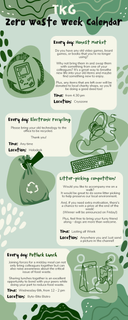During Zero Waste Week, it’s time to make small but significant changes to be more sustainable!
From individuals to businesses and communities, the waste generated by humans has had devastating effects on the world we live in - it doesn’t matter when we post this blog - if you look at global news, heartbreakingly there will be something happening in the world that can be linked to the destructive waste we create.
This is where Zero Waste Week comes in. Zero Waste Week is an annual awareness campaign encouraging people from all walks of life to consider the waste they generate and utilise sustainable consumption practices! Individuals are encouraged to make small and actually quite easy, but very important, changes to be more sustainable. For example, buying less food - the UK wastes approximately 9.5 million tonnes of food annually, and it's second only to the US in terms of countries that waste the most. Buying only the food you need, is a small but substantial change that would go a long way to be more sustainable.
Founded in 2008, the campaign promotes the goal of reducing the amount of material we throw away and instead reincorporating the by-products of one system for use in another system.
So… Why is it important? And why do we need to be mindful?
On average, the UK has been estimated to have generated 43.9 million tonnes of waste in 2018 alone, with the average person alone creating 400kg of waste each year. Household waste is one of the most significant sources of food waste produced in the UK, followed by construction, supermarkets and restaurants. Plastic alone is a huge issue, with UK households throwing away around 100 billion pieces of plastic packaging a year!
It’s crucial to the survival of the planet that we become more mindful and responsible for the waste we produce. Not only could we reduce our climate impact and minimising pollution, but also comes with the added benefit of conserving resources! Making just small and easy changes is very significant and goes a long way to doing your part for the planet.
